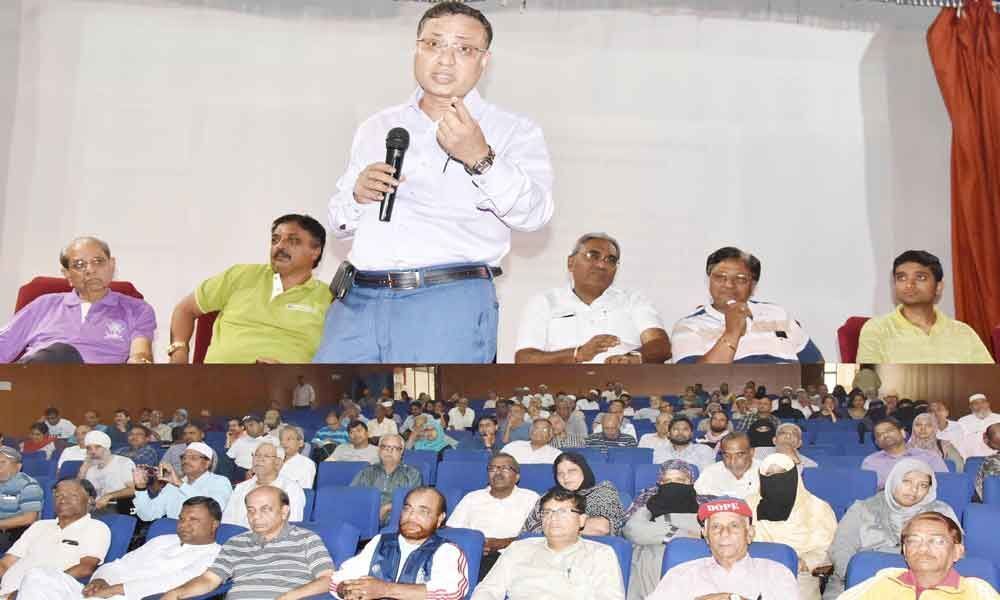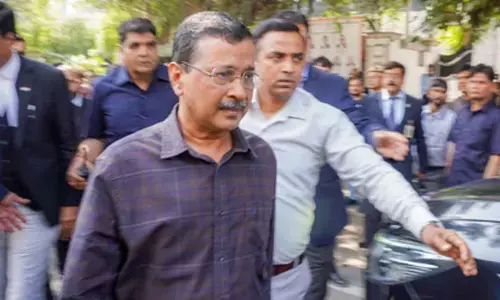Myths & facts about kidney ailments
 Myths & facts about kidney ailments
Myths & facts about kidney ailmentsThough diabetes is considered to be the commonest cause of kidney failure, even otherwise anyone can become victim of the disease, says Dr Tarun Kumar Saha, senior consultant nephrologist and transplant physician. He was delivering a Public Gardens Walkers Association’s monthly health lecture on ‘Kidneys – Myths and Facts’ at Public Gardens on Sunday.
Hyderabad: Though diabetes is considered to be the commonest cause of kidney failure, even otherwise anyone can become victim of the disease, says Dr Tarun Kumar Saha, senior consultant nephrologist and transplant physician. He was delivering a Public Gardens Walkers Association's monthly health lecture on 'Kidneys – Myths and Facts' at Public Gardens on Sunday.
The doctor said that the kidney disease is generally silent until it attains the final stage, stage – 5. The only way to diagnose early is to undergo annual blood and urine tests, which can help to identify, promptly treat the problem and arrest the progress of the disease.
People who have high risk of chronic kidney disease are diabetics, have high blood pressure, are generally above 60 years of age. They also suffer from severe obesity, family history of kidney disease, previous history of stone in the kidney and acute kidney injury.
People taking frequent pain killers without proper medical supervision are susceptible. There is higher prevalence in people of African, Hispanic, Aboriginal and Asian origin.
There are several misconceptions and myths about kidney disease in the mind of common people.
Myth 1) Kidney Disease is Rare
Fact: Kidney Disease is not uncommon. In America one in seven persons is suffering from some kidney disease. In India the frequency is likely to be higher due to higher frequency of Diabetes.
Myth 2) My Serum Creatinine level is slightly higher than normal, but I am perfectly well, so there is nothing to worry about.
Fact: Slightly abnormal Serum Creatinine e.g., 1.5 mg/dl means in both kidneys 50% function is already lost. Aggressive treatment with control of BP with suitable drugs, diet control, avoiding dehydration, regular monitoring even if the patient is not having any symptoms will help to retard the progression to dialysis stage and also prevents death due to other causes
Myth 3) Once a person develops a kidney disease, he or she is likely to require dialysis.
Fact: Majority of chronic kidney disease patients progress slowly if BP is controlled, diet is regulated and avoid kidney toxic drugs and are likely to die due to other causes or natural death before they reach to the stage of Dialysis. Proper treatment delays the need for dialysis and prevents the complication and death of the patient.
Myth 4) Kidney Patients are not supposed to take protein in diet
Fact: Kidney patient should avoid high protein diet. They can take normal or low protein diet in case there is not suffering from malnutrition.
Myth 5) Kidney patient should not eat tomato
Fact: Only people with stone in the kidneys should avoid tomato seeds. If potassium is not high, tomato can be taken by all kidney patients.
Myth 6) Kidney patient should take less water
Fact: Normal Healthy Person should take approximately 4 litres of water in 24 hours. However, in extreme hot and dry condition, water intake should be increased as situation demands. However, once someone develops kidney disease and swelling of body, then only water intake needs to be reduced. No one can tell any fixed amount for them it depends on the urine Volume of the patient.
Myth 7) Any person who is taking blood pressure medicines, it will automatically control blood pressure.
Fact: Only taking medicines to control BP, is not enough. Salt restriction in diet is equally or more important. In majority of the patients, both Salt Restriction and blood pressure medicines are required to control the BP.
Myth 8): Stop BP Medicine, once BP is controlled.
Fact: In majority of the cases, BP medicines need to be taken lifelong. Although dose adjustments or drug changes are needed by your Doctor from time to time.
Myth 9) Myths: BP should be checked by doctor at Hospital or Clinic
Fact: Hospital or clinic BP can be erroneous due to stress in the environments. Hence BP should be recorded preferably at home by self or family members with modern automatic BP machine. BP also needs to be checked at different time of day or night to detect diurnal variation. In some patient BP needs to checked in both supine and standing posture to check for any postural change in BP.
Myth 10) Doctor's visit and investigations should be done whenever patient develop any symptom.
Fact: Irrespective of symptoms patients should visit doctors and do regular investigations to know whether blood parameters are in control or not. Patients or their family members should know the reports also.
Myth 11) Good food will improve low haemoglobin and strengthen bones in kidney patients
Fact: Kidney produces few essential hormones/enzymes, one of them is essential to increase haemoglobin, other is needed to activate Vitamin – D. These Hormones/Enzymes needs to be supplemented to improve haemoglobin and improve calcium level and give strength to the bone. Sunlight alone or dietary calcium is not enough to active Vitamin – D in kidney patients.
Myth 12) Only Children need vaccinations
Fact: All kidney patients need vaccination against Pneumonia, Influenza, Herpes and Hepatitis B Virus.
Myth 13) Once Dialysis is started, Dialysis should be continued lifelong.
Fact: Dialysis is a replacement treatment for End Stage Kidney Failure. If kidneys cannot recover i.e. Kidney is damaged due to Chronic progressive disease, then a replacement treatment is in the form of either dialysis or Kidney Transplantation has to be done to remove the toxins and fluid from the body to sustain life. In case, Kidney failure occurs due to reversible disease like acute kidney injury, the kidney can recover and dialysis is needed on temporary basis. There is nothing wrong in the machine, that once somebody is attached to the machine, he or she requires dialysis lifelong. It is the nature of the disease i.e., End Stage Kidney Failure for which dialysis is advised lifelong as a replacement therapy.
Myth 14): Once dialysis is started, patient cannot survive beyond few months.
Fact: Nowadays the survival of the dialysis has improved dramatically in our country also. Majority of the patients are surviving more than 5 years on dialysis. One needs to follow the advice of qualified Nephrologists and do dialysis in a set up which follows the international standards of Dialysis Guidelines.








